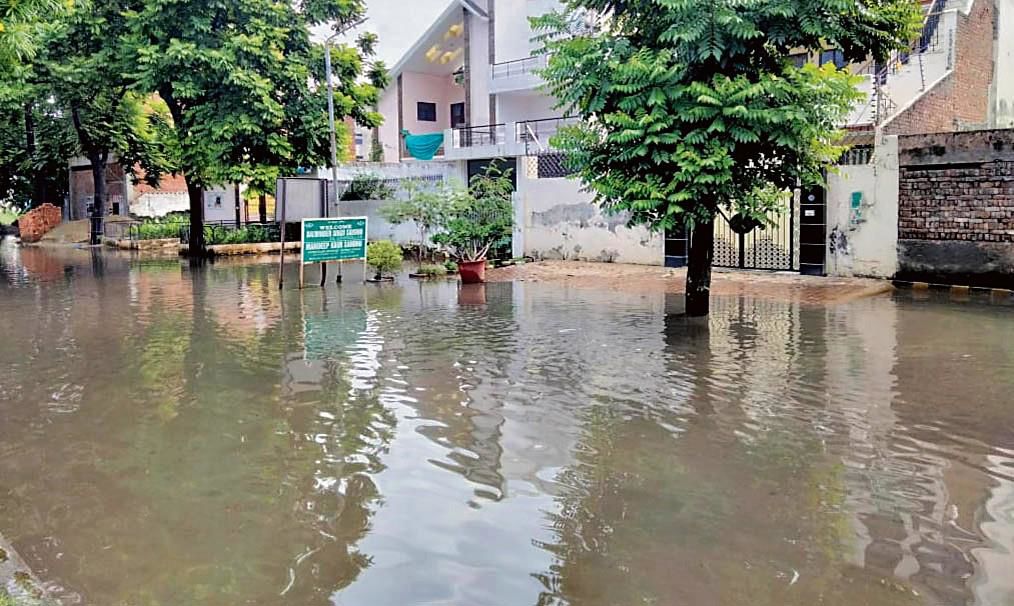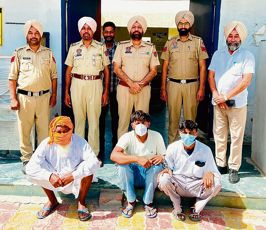
A flooded stretch of the main Chandigarh road. It is a common sight during the rainy season. File Photo
Increase capacity of drainage system
Ludhiana city has experienced growth in bridges and parks but no commensurate measures have been taken to handle monsoon-related woes caused due to the absence of the stormwater drainage system in many parts of the city. Even where there is a stormwater drainage system, the lines are frequently clogged with debris, so that even a brief spell of rain can lead to many areas experience waterlogging, causing asset-damage and traffic snarls. This necessitates increasing the capacity of the existing drainage system and constructing stormwater drainage systems where none exist. Stormwater systems use a network of underground pipes to direct excess rain and groundwater runoff from impervious surfaces like parking lots, roofs and paved streets into waterways. The demand for an effective stormwater drainage system has grown in tandem with the expansion of our cities and populations, as impervious surfaces cover a large portion of developed areas, preventing water from seeping into the soil and, instead, accumulating on the surface. It is critical that authorities address the waterlogging problem before it worsens. Its pointless to have a smart city tag if our neighbourhoods remain flooded.
Novin ChrisTopher
Contaminated water supply major concern
Rainwater accumulation is a major issue in various parts of Ludhiana during the rainy season every year, when water often flows into houses in low-lying areas of the city. Over 80 per cent of the city areas lack a stormwater drainage system. Due to poor drainage, the problem of waterlogging and overflowing sewers afflicts most areas of the city after rains, resulting in the accumulation of dirty water on roads and streets. Sewage from overflowing drains flows into tubewell bores, thereby contaminating freshwater. Residents rue that the problem of choked sewer lines and contaminated water supply dogs them year after year, and they are forced to drink water laced with sewage during the rainy days. This makes them vulnerable to water-borne diseases like jaundice, diarrhoea, dengue, malaria, typhoid, etc. The MC should deploy super-suction machines to clean sewer lines more effectively to solve the problem and take other concrete steps to put an end to these long-standing issues. A dedicated stormwater drainage system is required in the city as a huge amount of rainwater is wasted as it flows into sewerage. Steps should also be taken to store rainwater and later use it for commercial, construction and other purposes. As the stormwater drainage system is available only in some areas of the city, the MC should take immediate steps to install stormwater drainage systems in the remaining areas to ensure optimum utilisation of the excess rainwater, which otherwise floods low-lying areas and causes significant problems like property damage and even loss of lives. The MC should construct desilting chambers next to the road gullies and send sewage to treatment plants.
RS Sembhi
Proactive maintenance programmes needed
As a drainage system continues to be non-existent in most places, its absence can have a number of negative effects on the city’s residents. To begin with, when there is inadequate drainage infrastructure, there is a greater chance of flooding. Floodwater can submerge homes, businesses and streets, resulting in property damage, resident displacement and interruptions to vital services like utilities and transportation. Moreover, standing water can serve as a breeding space for mosquitoes and other pests, increasing the possibility of vector-borne diseases. It is necessary to create a thorough drainage masterplan that takes into account regional differences, current rainfall patterns and projected population increase. To stop illicit dumping and encroachments that obstruct natural water flow, a strict regulatory framework must be put in place and maintained. Maintaining the system’s integrity requires proactive maintenance programmes and routine inspections, which include vegetation control, pipe repairs and sediment removal. In addition, in order to educate citizens about the consequences of inappropriate garbage disposal and to motivate them to actively participate in storm drain maintenance, it is essential to promote public awareness programmes. To reduce impermeable surface area and protect important natural drainage pathways, drainage planning must be coordinated with more comprehensive land use schemes. Given the importance of climate resilience, investments in adaptive infrastructure and floodplain management, measures are required to strengthen the urban drainage system’s capacity to endure increasing precipitation events. Effective drainage management relies on cooperation among various stakeholders, such as the corporate sector, governmental organisations and neighbourhood associations. In order to reduce the risk of floods, maintain water quality and promote urban resilience in the face of growing climate problems, communities can strengthen their drainage infrastructure through this coordinated effort.
Sofia Khan
Use permeable pavements, green roofs
To improve the drainage system, the city should invest in proper infrastructure maintenance. Collaboration between local authorities and the community is essential. By implementing sustainable drainage solutions such as constructing permeable pavements, green roofs, rain gardens, detention basins and artificial wetlands, we can ensure significant positive results.
Ishita Aggarwal
Utilise international tech expertise
To establish an effective drainage system, the government must develop a comprehensive drainage masterplan for all areas. The authorities should use international technological expertise tailored to local conditions, set up stormwater drainage systems that meet environmental and social standards, strengthen institutional and organisational capacity to regulate the drainage system and encourage active citizen participation and private sector involvement in system maintenance. Furthermore, the government should work with institutions such as environmental regulators to ensure effective implementation of the solutions.
Tamanpreet Kaur Khangura
Pay attention to Low-lying areas
An effective drainage system is of the utmost importance due to the ongoing problem of waterlogging in our city, especially in the low-lying areas. Taking recourse to modern-day technology, we can use different management approaches like installing pumping stations to help pump water from the lower areas to higher ones, thus preventing flooding and waterlogging. Green roofs can be installed on buildings to absorb rainfall. Along with this, rain gardens with native plants can also be efficacious in such conditions. One should always remember that our city’s wellbeing is not just the government’s responsibility — it’s our responsibility as well. By creating awareness, practising proper waste disposal and taking care of our drainage system, we can tackle this problem in a better way.
Rashika
litter on roads ends up in sewers
The existing drainage system must be reviewed and necessary repairs or modifications must be carried out. The drains should be cleaned regularly. The authorities must monitor the condition of drains on a regular basis. The roads must be repaired from time to time and the potholes should be filled to avoid waterlogging. Citizens should not throw waste in the open as this leads to choking of drains. Water pumps should be installed in areas which are the worst-hit by the waterlogging problem.
Shreysa
Proper sloping of roads, drains needed
During rain, the problem of waterlogging is commonplace in the city. Waterlogging, which may be caused by the dumping of garbage and waste that may clog the drainage system, is harmful for our properties. We should take care of some basic things to curb the problem of waterlogging: We should not throw garbage on roads as this could lead to clogging of the drainage system; local bodies should take care of broken pipelines; proper designing and sloping should be taken into consideration at the time of laying pipelines; the government should impose a fine on the people who throw waste on roads during rains; water pipes should be laid by following a proper urban planning system; larger pipes with proper sloping should be layered taking into consideration the pressures of a rising population; proper advertisements, training and education should be imparted to staff at corporations, students and public in general; an effective sewerage system is a must; finally, roads should be constructed with proper slopes towards the drains on both sides.
Dr Mohd Farooqui
Build proer infra, ensure upkeep
Recently, low-lying areas of the city were waterlogged after a few spells of rain. There are various reasons behind this problem, such as irregular grading, dips, cracks and a poorly installed clogged gutters. To make the situation a bit more manageable, some measures need to be adopted. More attention should be paid to the maintenance and development of proper infrastructure for the drainage system. There should be a proper regular checkpoint to remove the debris and ensure water flow. There is a pressing need to invest in modern solutions such as permeable pavements and sustainable drainage system (SuDS). Addressing these issues with feasible eco-friendly solutions can result in positive change.
Purva
Develop lakes to store rainwater
The problem of waterlogging in Ludhiana during the last brief spell of rain this winter is highlighted in these columns. Causes of this problem are many, so a multi-pronged strategy is needed. To root out this problem, the authorities must begin with a quality audit of the whole city, especially areas which are prone to waterlogging; engineers should earmark possible drainage routes, develop drainage passages and periodically clean the said drains. The municipal authorities should provide alternative methods for pumping extra water into the drains and develop lakes in and around the city for storing rainwater — this, in turn, will replenish the water table, the need of the hour. People should desist from polluting and choking the drains with plastic waste and, instead, should segregate dry and wet wastes properly. The municipal authorities should collect garbage door-to-door daily, replicating the models employed in Chandigarh. This can work wonders here as well. Lastly, all stakeholders should work in tandem and passionately. All these measures have the potential to solve the waterlogging problem.
Sukhdev Sharma
Clean drains on regular intervals
The drains should be cleaned regularly. If required, new structures such as inlets, open channels and linear drainage channels should be created. The authorities must monitor the condition of drains on a regular basis.
Laksh Negi
Contractors should be responsible
Waterlogging is a common problem which is observed each and every year during the monsoon. Water gets accumulated on roads as there is no proper drainage system. The local government should construct roads after laying proper large pipes to drain the rainwater. Nobody should be allowed to dig roads without prior permission. Each household or business establishment must be provided a connection to sewerage, drinking water lines and electricity before roads are carpeted and then, when found, violators must be punished. We must not throw garbage on the roads, as this may be one of the reasons of accumulation of water on roads. Plastic bags should be banned. People should lend support to the local government to curb such problems. Low-lying areas must be raised and carpeted so that the problem of water accumulation is addressed. Local bodies and contractors must take responsibility.
Farzana Khan
Ensure roads remain clean
As a resident of the city, I believe the first step must be identification of the problem which according to me is a lack of cleaning of roads. The garbage including non-biodegradable articles get into the drainage system which leads to blockage in pipelines. This problem could be tackled by spreading awareness among people about keeping roads clean. Second, it has been observed after installing pipes the local body officials don’t bother to upkeep the roads which leads to waterlogging and accidents. I hope you will work on it.
Mihir Gaba
Cleanliness is next to godliness
Apropos of ‘cleanliness is next to godliness,’ it is must to maintain cleanliness in our surroundings since waterlogging caused due to clogged pipelines leads to water-borne diseases. An effective drainage system must be ensured by the municipal corporation. Funds should be raised for the reconstruction of damaged drains. If not rectified at the earliest it will lead to other obstructions likely to occur on the roads, like the disgusting smell of sewage and traffic snarls.
Kamaldeep Kaur
Working on revamping system
Since the stormwater drainage system did not exist in certain areas of the city and was inadequate in other pockets, we are working on revamping the entire drainage system to check the problem of waterlogging and allied issues being faced by residents. — Sandeep Rishi, MC Commissioner
QUESTION
“Aap Di Sarkar, Aap De Dwar”, a novel initiative of the Bhagwant Mann-led AAP government in the state to deliver the public services and redress the grievances at the doorsteps of the residents, has evoked an overwhelming response in Ludhiana district. What else should be done to facilitate people and ensure accountability, responsiveness and transparency in the public delivery system?
Suggestions in not more than 200 words can be sent to [email protected] by Thursday (February 15)
Join Whatsapp Channel of The Tribune for latest updates.



























